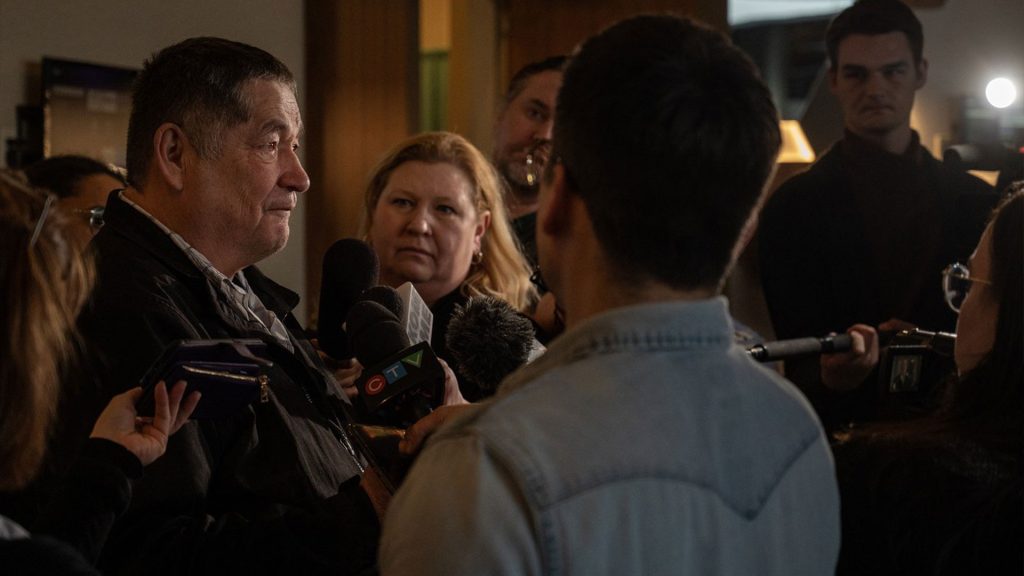
Darryl Burns, whose sister Gloria was one of the people killed on James Smith Cree Nation, speaks to media during an afternoon break in the inquest into the apprehension and death of Myles Sanderson, who killed 11 people and injured 17 others in the community and the nearby community of Weldon back in September 2022, held at a hotel conference room in Saskatoon, Tuesday, February 27, 2024. Photo: Liam Richards/The Canadian Press.
Jury deliberations have begun at a Saskatchewan coroner’s inquest into how a man who stabbed and killed 11 people and injured 17 others died in police custody.
Robert Kennedy, the coroner overseeing the inquest, told jurors Thursday they will have to determine whether Myles Sanderson intended to kill himself when he consumed a toxic amount of cocaine on Sept. 7, 2022, or whether it was an accidental overdose.
The inquest is to establish when and where Sanderson died and the cause of his death. The six-person jury may also provide recommendations.
Earlier Thursday, a criminal investigative psychologist told jurors the mass killer didn’t intend to die while being taken into custody.
Matt Logan said Sanderson was still on a mission after the stabbing massacre. His goal was to harm the mother of his children, Vanessa Burns.
“He didn’t really care one way or another if he lived or died,” Logan, who is also a former RCMP officer, testified Thursday.
Three days earlier, Sanderson had gone door to door stabbing people on the James Smith Cree Nation and nearby village of Weldon, northeast of Saskatoon.
The psychologist said Sanderson and his brother, Damien Sanderson, talked with people about being on a mission before the rampage began.
Myles Sanderson first killed his brother. He then targeted his victims because of a perceived grievance, an association with a gang or because they just got in his way, Logan said.
The final target was to be his common-law partner, Logan said.
“Our observation is Sanderson had not completed his mission.”
Read More:
Myles Sanderson had high levels of cocaine in his system when he died
The inquest heard Logan reviewed Sanderson’s court records, visited the First Nation and spoke with family members. But he didn’t meet Sanderson, and nobody can be certain what the killer was thinking before he died.
Logan said after Sanderson had been on the run for days, he pumped himself up with cocaine and went to track down his partner.
He broke into a house and stole a truck but didn’t physically harm the homeowner because she wasn’t a target, Logan said. That’s also why Sanderson didn’t harm another man, whom he tried to pay $250 for a ride to Saskatoon, the psychologist added.
After the homeowner called police, Mounties quickly descended on the area.
Inquest jurors saw video from RCMP dashboard cameras of a high-speed police pursuit that ended with the truck Sanderson was driving going into a ditch on a highway north of Saskatoon.
After Sanderson was removed from the vehicle. He asked how many people he had killed and why officers didn’t shoot him.
Sanderson was smug and arrogant during the arrest, Const. Bill Rowley testified Wednesday.
That matches with Sanderson’s personality, said Logan, adding the killer had many psychopathic traits.
Logan said, in his opinion, Sanderson took more cocaine when the truck crashed because he thought, “Why waste good cocaine?”
“If he wanted to die — go out in a blaze of glory — he would have done it in another way,” Logan said.
In the video, Sanderson’s knees buckle and he is placed on the ground. Mounties and paramedics told the inquest he began to have seizures.
Sanderson was placed in an ambulance and taken to a hospital in Saskatoon. A paramedic testified Sanderson flatlined during the drive.
Sanderson’s partner said Wednesday the inquest has brought up complex emotions. Her father, Earl Burns Sr., was killed by Sanderson on the First Nation.
Vanessa Burns said she felt disappointment and anger that Sanderson didn’t show any remorse.
“It was hurtful,” she said.
Story by Kelly Geraldine Malone.










